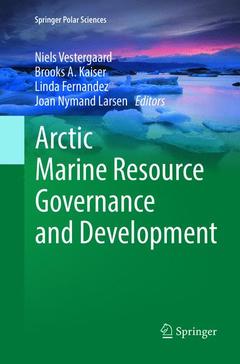Description
Arctic Marine Resource Governance and Development, Softcover reprint of the original 1st ed. 2018
Springer Polar Sciences Series
Coordinators: Vestergaard Niels, Kaiser Brooks A., Fernandez Linda, Nymand Larsen Joan
Language: English
Subjects for Arctic Marine Resource Governance and Development:
Publication date: 06-2019
235 p. · 15.5x23.5 cm · Paperback
Publication date: 02-2018
Support: Print on demand
Description
/li>Contents
/li>Biography
/li>Comment
/li>
This book is based on presentations from the Conference ?Arctic Marine Resource Governance? held in Reykjavik Iceland in October 2015. The book is divided into four main themes: 1. Global management and institutions for Arctic marine resources 2. Resource stewards and users: local and indigenous co-management 3. Governance gaps in Arctic marine resource management and 4. Multi-scale, ecosystem-based, Arctic marine resource management?.
The ecosystem changes underway in the Arctic region are expected to have significant impacts on living resources in both the short and long run, and current actions and policies adopted over such resource governance will have serious and ultimately irreversible consequences in the near and long terms.Preface.- 1. Sino-American Arctic Marine Resource Knowledge Networks and Governance.- 2. Transboundary Governance Capacity in the Arctic: A Framework for Inquiry.- 3. How Canadian and U.S. Arctic policies will adapt to the differing interests of the Nordic and Asian blocks on the Arctic Council.- 4. Reshaping Energy Governance in the Arctic? Assessing the Implications of LNG for European shipping companies.- 5. Much Ado About Nothing? Regulating Fisheries in the Central Arctic Ocean.- 6. Marine co-management through the Torngat Joint Fisheries Board.- 7. Bio-economic analysis for Arctic Marine Resource Management Policy.- 8. Technical and Institutional Change: Past and Future Transitions in Resource-Based Inuit Communities.- 9. Ballast water and invasive species in the Arctic.- 10. Arctic Port Development.- Conclu
sions.Linda Fernandez:
Linda Fernandez is associate professor of environmental and resource economics at Virginia Commonwealth University in the Department of Economics and Center for Environmental Studies. She received her PhD from the University of California, Berkeley. Her research explores public and private economic incentives for pollution control and natural resource protection at local through international scales. Transboundary environmental management has been a steady research topic at different scales of analysis of multi environmental media (air
, land, water). Her research findings have been used to inform policymakers at state, national and international levels of governance. International maritime trade and marine resource management between countries is a current research area set in the Arctic with grant funding from the Belmont Forum/National Science Foundation. She has received research grants from the National Science Foundation, U.S. Dept. of Agriculture, Commission for Environmental Cooperation, Haynes Foundation and the Institute on Global Conflict and Cooperation.
Joan Nymand Larsen:
Dr. Joan Nymand Larsen is professor of economics and Arctic studies at University of Akureyri, and research director and senior scientist at the Stefansson Arctic Institute, Akureyri, Iceland. Her current research is focused on the issues and challenges of economic development and living conditions in the Arctic; socio-economic impacts of global change; and the development of systems for monitoring human well-being. She is co-editor of the Arctic Human Development Report (2015); Arctic Social Indicators (2015); The New Arctic (2015); editor of The Polar Journal´s special issue on Polar Economics (2016); and coordinating lead author of the IPCC 5th assessment report´s Polar Regions chapter (2014).
Brooks Kaiser:
Dr. Brooks Kaiser is an environmental and resource economist and economichistorian




